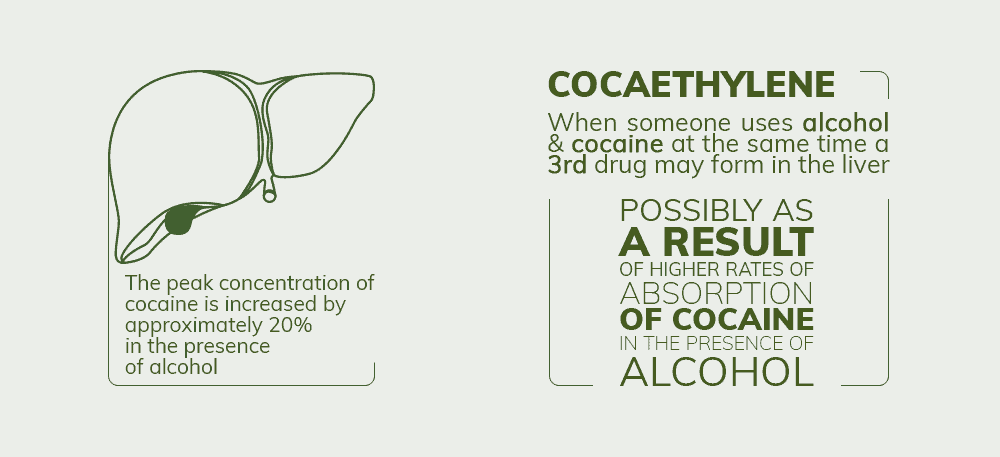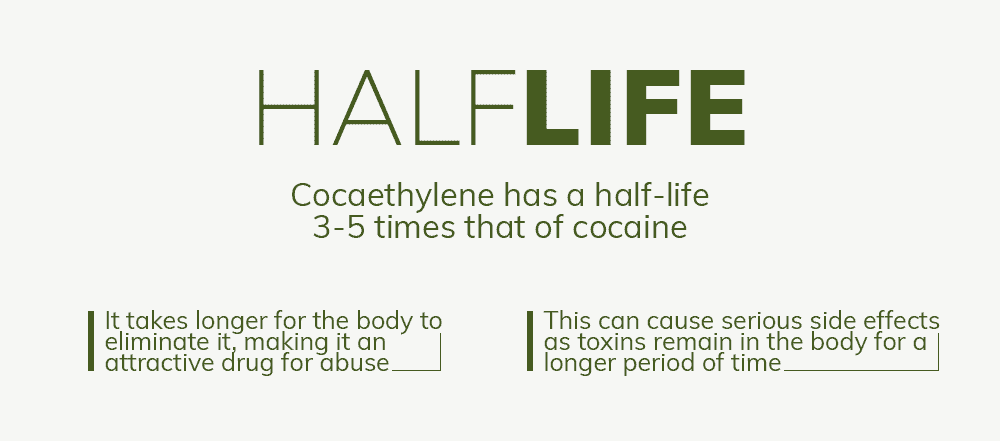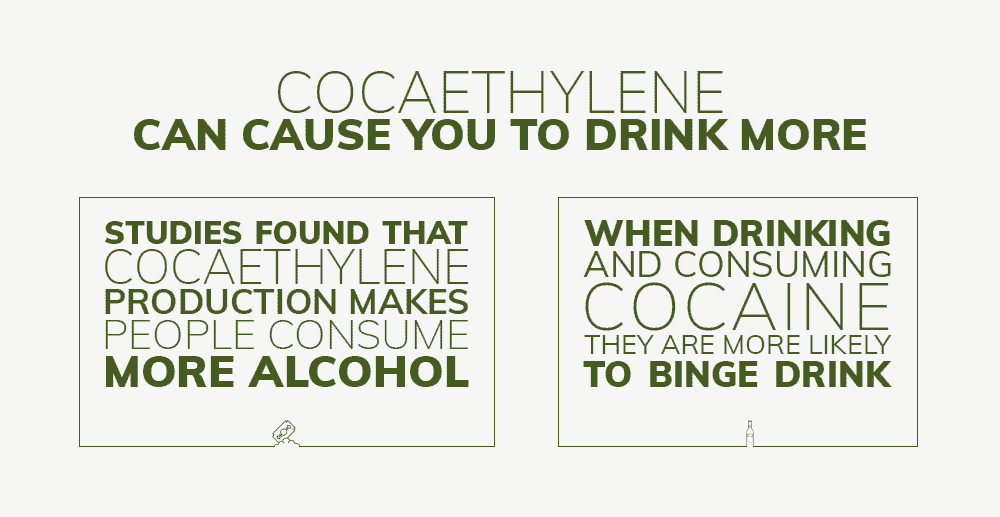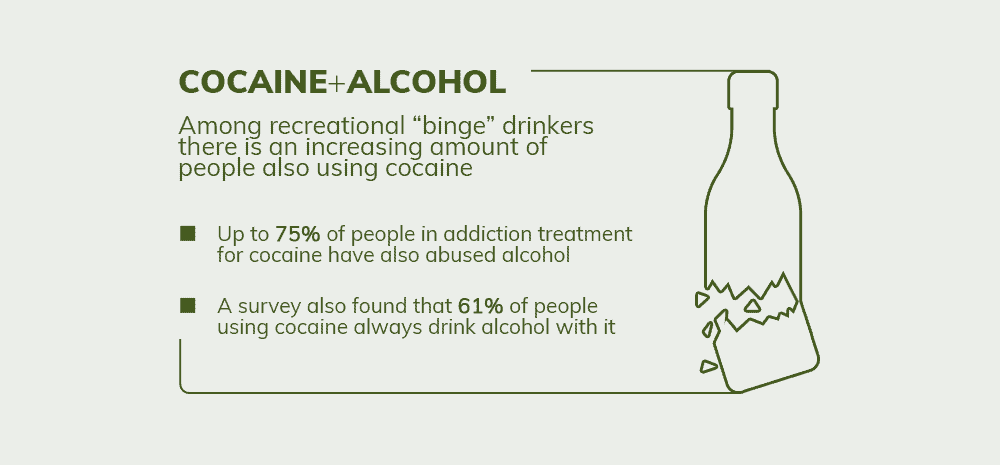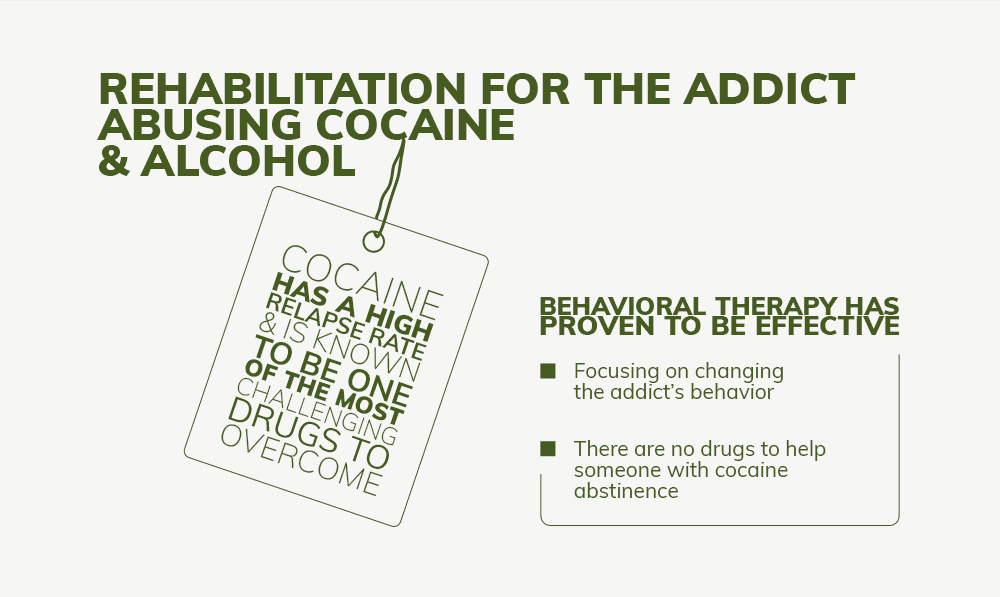Cocaethylene is a rare production that occurs within your body. Using alcohol and cocaine simultaneously causes a third drug to form. Your liver is responsible for detoxifying your body. Substances you abuse like cocaine and alcohol will pass through your blood and into your liver. When alcohol and cocaine meet in your liver at the same time, cocaethylene may be produced. The production of cocaethylene is the only known example where your body creates a third drug when cocaine and alcohol are combined. The euphoric effects make it alluring enough that people will combine alcohol and cocaine to get the cocaethylene high. Cocaine addiction is dangerous enough on the system but cocaethylene comes with supercharged effects that are even more deadly. For those who think of themselves as casual cocaine users, they are just at risk as others. The reality is, cocaine overdoses have doubled in the past five years. Many of the time, alcohol is playing a part in the increase. Here is what you need to know about cocaethylene, a risk of mixing cocaine and alcohol together.
“Get your loved one the help they need. Our substance use disorder program accepts many health insurance plans, this is our residential program.”
The Cocaethylene Occurrence
For this to occur, 20% of the cocaine being processed would have to be disrupted by alcohol. The liver will try to eliminate cocaethylene but the alcohol slows down this process. Cocaethylene will develop in the liver and move through the blood and into the brain. This is where it affects the receptors in the brain. The risk of a sudden overdose that leads to death is 18 time greater when cocathylene toxicity occurs. You feel fine one minute and the next minute, it hits you. 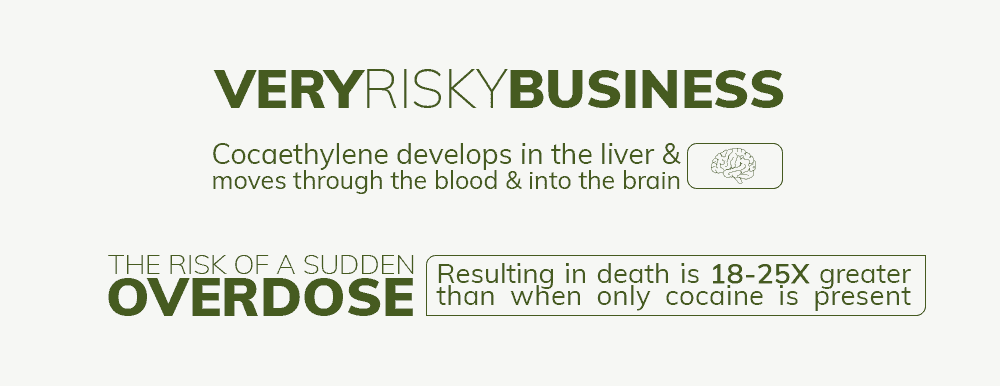
Cocaethylene and Cocaine Effects
In a brain analysis, it showed that cocaethylene and cocaine produce the same euphoric effects. This would indicate that the dependency on cocaine occurs just as much with a drug our body creates. Cocaethylene effects are actually more intense and also more dangerous than cocaine as they are enhanced and last longer.
Why Do People Combine Alcohol and Cocaine?
Drug users will use both alcohol and cocaine together to feel less drunk and tired. Alcohol will intensify the cocaine high and will reduce the negative symptoms that occur when crashing from cocaine use. Cocaine is a party drug and often times, a night that starts with a few drinks can lead to seeking out cocaine so the partier can keep going. This is what makes it used by youth and middle aged people alike. A survey completed in the U.S. found that about 5 million people were using cocaine per month.
Cocaethylene Toxicity
Cocaine allows you to drink more while alcohol enhances cocaine, making it last twice as long. Taking alcohol and cocaine together can cause cocaethylene toxicity in the body. This is when alcohol and cocaine come together in the liver. Scientists believe this happens because the metabolism of cocaine is altered from the alcohol. The production of cocaethylene in the liver starts two hours after alcohol and cocaine have been taken together. For cocoethylene production, it is believed that 20% of the cocaine that’s being metabolized in the liver would be affected by alcohol. The liver will then try to get rid of cocaethylene but is slowed down by the alcohol. This then leaves the cocaethylene in the system.
“We treat both addiction and co-occurring disorders and accept many health insurance plans. Take a look at our inpatient program.”
Cocaethylene Side Effects
The production of cocaethylene creates many health risks which can include sudden heart attacks or impulsive behavior. As it lasts so long in the system with the same effect as cocaine, it takes a toll on the body. Here are the common side effects when cocaethylene is produced in the liver:
Toxic Effects Increase
When cocaethylene is produced in the liver, it’s important to understand that it’s actually more toxic than cocaine. Studies have found that cocaethylene toxicity is 30% more than cocaine. Once the liver starts producing it, chemicals are released through the body that will last three times longer than cocaine. It can last up to 12 hours once production in the liver has occurred. This creates potential for toxins to seriously affect the body. It’s been found that many overdose deaths occurring with cocaine included alcohol in the system. This leads researchers to believe that cocaethylene toxicity is responsible for many sudden deaths and heart problems with cocaine users.
Cardiovascular Risks
Cardiovascular issues are a risk because cocaethylene increases your blood pressure and heart rate. It also prevents the heart muscle from contracting. As it effects the body for so long, it adds even more risks.
Risk of Stroke
Cocaethylene puts you at greater risk of having a stroke than if you were just using alcohol and cocaine.
Risk of Liver Damage
Cocaethylene toxicity can lead to liver damage more than if cocaine and alcohol abused separately.
Greater Effects of Alcohol and Cocaine
The cocaethylene high produces euphoric effects because it blocks the reuptake of dopamine. This causes you to be more prone to abuse both drugs. Though there is no proof of cocaethylene addiction, there is proof that people who start drinking will seek out cocaine also for the effects.
Cocaethylene Half-Life Can Cause Serious Side Effects
Not only are the effects of cocaethylene toxicity greater than cocaine or alcohol, it also lasts for longer. It has a greater half-life than cocaine so it takes longer for the body to eliminate it. This can cause serious side effects because it’s toxins in the body for a longer period of time.
Cocaethylene Can Cause You to Drink More
Studies have found that cocaethylene production can actually make you consume more alcohol. If you’re drinking and doing cocaine, you’ll likely binge drink. When you binge drink enough, you can cause serious health issues such as:
- Problems with your cardiovascular system.
- Nerve damage.
- Liver damage.
- Alcohol poisoning.
- Risky behavior and poor judgment.
- A much faster development of alcohol dependence.

You’ll Take Greater Risks
Cocaine and alcohol effects that cause cocaethylene to be produced will cause you to be more impulsive. This is due to the increase of dopamine and serotonin levels. You will be at risk of taking part in impulsive behaviors. This can include violence, unprotected sex, or taking whatever drugs are available around you.
Risk of Fatality
The combination of cocaine and alcohol effects are believed to be one of the most fatal when it comes to substance abuse. The potential of death is high for a variety of reasons. Not only are the systems in the body being taxed, but risky behaviors can also put you at risk.
“We accept many health insurance plans. Get your life back in order, take a look at our residential program.”
Cocaethylene Addiction
It is well known that cocaine is an addictive substance but is it possible for one to become addicted to cocaethylene? It is essentially a high that the body produces as ethyl alcohol interferes with the body’s efforts to stop cocaine from circulating in the bloodstream. Euphoric feelings are even more powerful than cocaine and will last longer. There hasn’t been enough studies to back up the theory but some researchers do believe there is a correlation between alcohol and cocaine use for the sake of producing cocaethylene effects.
Alcohol and Cocaine Prevalence
A publication came out discussing how one could treat cocaethylene abuse. It’s believed to be becoming more popular to intentionally combine alcohol and cocaine to get a greater high. This is why strategic approaches need to be created. Researchers have found cocaethylene to be far risky for your health. The risk of violence among users is also a concern. Among recreational “binge” drinkers, there is an increasing amount of people also using cocaine. There is not a lot of understanding of cocaethylene. The separate data on alcohol and cocaine use can be used to theorize cocaethylene effects and addictive patterns. There is a high level of prevalence between alcohol and cocaine use. Up to 75% of people in addiction treatment for cocaine have also abused alcohol. A survey also found that 61% of people using cocaine always drink alcohol with it.
Cocaine and Alcohol Treatment
The suggested cocaine and alcohol treatment is psychosocial. This has been shown to be effective for the alcohol and cocaine user and the one who abuses both. It is believed there should be professionals that are specifically trained in responding to the needs of someone using cocaine with alcohol. Further research should be implemented to know if abusers of both substances are doing so in order to obtain the cocaethylene production in the body. Cocaine withdrawal can be quite intense and alcohol withdrawal can cause dangerous side effects. As detox becomes more complex when you have two substance to quit, it’s suggested that you do inpatient alcohol rehabilitation for a successful recovery.
Rehabilitation for the Addict Abusing Cocaine and Alcohol
Cocaine has a high relapse rate and is known to be one of the most challenging drugs to overcome. There are biological changes to brain cells that occur when it is abused for long periods of time. It causes intense cravings that may occur for years after abstinence. Treatment for cocaine and alcohol abuse is a long road. The concurrent alcohol and cocaine abuse will entail dealing with physical, social, and psychological issues. Behavioral therapy has been effective, focusing on changing the addict’s behavior. There are no drugs to help someone with cocaine abstinence. Alcohol detox may entail similar therapy following detox.
Lack of Knowledge of Cocaine and Alcohol Abuse
Presently, there seems to be very little recognition of the health hazards and social issues related to the combined abuse of alcohol and cocaine. While cocaine and alcohol have been used together for decades, there really is no policy that addresses the problem. There is an increase of people abusing both simultaneously and chronically. The dangers are much higher than if alcohol and cocaine were abused separately. The reason for the risks associated with combining alcohol with cocaine are due to the production of cocaethylene. While the high might be greater, it comes with a greater risk of health issues.
What Did you Think About This Blog?
Give it a Rating!

